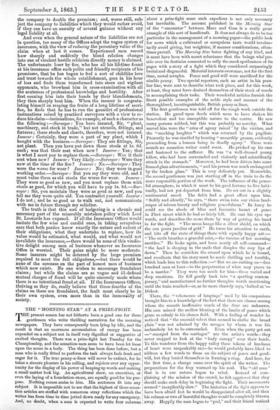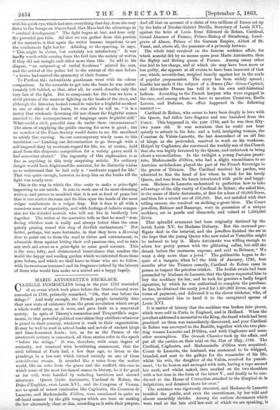THE "MORNING STAR" AT A PRIZE-FIGHT.
THEpresent season has not hitherto been a good one for those gentlemen who write thrilling narratives for the morning newspapers. They have consequently been lying by idle, and the result is that an enormous accumulation of energy has been expended on a subject not in itself very dignified or suggestive of exalted thoughts. There was a prize-fight last Tuesday for the Championship, and the sensation-men seem to have been let loose upon the scene in a body. The thing has been done before, but a man who is really fitted to perform the task always feels fresh and eager for it. The true penny-a-liner will never be extinct, for he takes a sincere pleasure in his calling, and rejoices over any oppor- tunity for the display of his power of heaping up words and making a small matter look big. An agricultural show, an execution, or even the laying of a foundation-stone, are equally good for his pur- pose. Nothing comes amiss to him. His sentences fit into any subject. It is impossible not to see that the highest of these sensa- tion articles are stuffed with numerous stray reflections which the writer has from time to time jotted down ready for any emergency. And, no doubt, when a man is expected to write four columns about a prize-fight some such expedient is not only necessary but inevitable. The account published in the Morning Star of the " encounter " between Mace and Goss is a really great
example of this sort of handicraft. It does not always do to be too particular in the management of a morning paper—the public look for news which a cultivated or scrupulous taste would involun-
tarily avoid giving, but weightier, if meaner considerations, often- times prevail. The Morning Star hates fighting of any kind, and
it must have been with secret reluctance that the beings who'pre- side over its destinies consented to sully the meek spotlessness of its pages with a story of a fight which they considered surpassingly brutal and disgraceful. Material interests overcame, not for the first
time, moral scruples. Peace and good-will were sacrificed for the nimble penny. Two special reporters, each an artist in his pecu- liar line, were sent to describe what took place, and for this week, at least, they must have drained themselves of their stock of words in accomplishing their tasks. Their wonderful articles furnish the finest possible examples of the noble style and manner of the thoroughbred, inextinguishable, British penny-a-liner.
The first gentleman was told off for the rough work outside the station. He gazed upon deeds which seen to have shaken his.
benevolent and too susceptible nature to the centre. He saw many persons robbed, but this was probably no novelty. What moved him were the " cries of agony raised " by the victims, and the "mocking laughter" which was returned by the pugilists.
Presently he was startled by hearing " unearthly groans, evidently proceeding from a human being in deadly agony." These were sounds no sensation -writer could resist. He pricked up his ears and hastened to the sufferer. He was "a well-dressed young
fellow, who had been surrounded and violently and scientifically struck in the stomach." Moreover, he had been driven into some
framed glass advertisements, " and his person was much endangered'. by the broken glass." This is very delicately put. Meanwhile,. the second gentleman was just starting off in the train to do the- more responsible portion of the work. The influence of the peace- ful atmosphere, in which it must be his good fortune to live habi- tually, had not yet departed from him. He set out in a slightly sentimental mood. The fields had a great effect upon him. " Softly and silently," he says, " there swim into our vision land- scapes of solemn beauty and religious peacefulness." In fancy he could see the abode of bliss and favourite haunt of peace in Fleet street which he had so lately left. He cast his eyes up- wards, and describes the scene there by way of getting his hand in for the fight. " The moon hangs like a silver shield, on which the sun pours javelins of gold." He turns his attention to earth, and hits off the state of things there with equally happy art :— " The earth breathes a graceful mist, the incense of her morning sacrifice." He looks again, and loses nearly all self-command- " the land is sleeping in the smile that dimples the rosy lips of dawn." Then he considers the errand upon which he is bound, and recollects that his story must be made thrilling and terrible, which leads him to this reflection :—" But we are rushing on—five hundred men at least—to the perpetration of what may prove to be a murder." They were too much for him—these varied and deep emotions. lie fell gently back into "a sporting contem porary," and manufactured no further thoughts worth mentioning until the train reached—or, as he more chastely says, ' halted at '— Didcot.
There, the " vehemence of language" used by his companions brought him to a knowledge of the fact that there are classes among whom the smooth inoffensive words of the Star are unknown. His ears missed the mellow bleating of the lambs of peace which graze so calmly in his chosen field. With a feeling of wonder he noticed that "the emerald velvet that seemed to clothe the broad plain " was not admired by the savages by whom it was his melancholy lot to be surrounded. Even when the party got out
emerged from the carriages" are the artist's words—they never stopped to look at the "leafy canopy" over their heads. To this wanderer from the happy valley these tokens of hardness of heart were unspeakably sad—he would probably have liked to address a few words to them on the subject of peace and good- will, but they busied themselves in forming a ring. And here, for the first time, a change came over the spirit of the writer. The preparations for the fray warmed up his soul. The "old man" that is in our nature began to rebel. Instead of com- plaining of the mission of the crowd, he felt aggrieved that they should make such delay in beginning the fight. Their movements seemed " inexplicably slow." The historian of the fight appears to have been afraid lest he would be disappointed after all, and then his column or two of beautiful thoughts would be completely thrown away. Happily the men began to "peel," and their friend noticed
with his quick eye, which had seen everything that day, from the rosy dawn to the bumps on Mace's head, that Mace had the advantage in " cerebral development." The fight began at last, and here only the powerful pen fails. All that we can gather from this portion of the narrative is that again the writer became impatient to see the combatants fight harder. Alluding to the sparring, he says, " This might be clever, but certainly not satisfactory." It was hardly worth while coming from the fold into the society of wolves if they did not mangle each other more than this. To add to his disgust, " an outpouring of verbal feculence " saluted his ears, and the arrival of the police led to the retreat of the men before " a bruise had marred the symmetry of their frames."
To Purfleet this indomitable gentleman went with his odious companions. In the scramble to get into the boats he was unfor- tunately left behind, so that, after all, he could describe only the very last of the fight. But to compensate for this loss we have a vivid picture of the amateur fighting on the banks of the river, and although the historian looked round in vain for a frightful accident in one or other of the boats, he was able to tell us, " it is a mercy that wholesale drowning did not climax the frightful scenes enacted to the accompaniment of language more frightful still." What could a civil, peaceful Man do under these circumstances? The stress of supplying the public craving for news is great ; but no member of the Peace Society would desire to see life sacrificed to satisfy that craving. So our contemporary wisely came, to this resolution :—" Limiting our determination to go through with a self-imgosed duty by moderate regard for life, we, of course, held aloof from this desperate competition for a watery grave until it had somewhat abated." The ingenuity of this explanation is as fine as anything in this truly surprising article. No ordinary danger would have frightened the narrator, for he distinctly wishes us to understand that he had only a " moderate regard for life." That was quite enough, however, to keep him on the banks till the fight was nearly over.
This is the way in which the Star seeks to make a prize-fight improving to our minds. It sets to work one of its most charming writers, and proves to mankind that it is not so fond of peace but that it can scatter its roses and its lilies upon the heads of the most vulgar combatants in a vulgar fray. But it does it all with a conscious sense of superiority, and with feelings of infinite compas- sion for the deluded mortals who will not live in brotherly love together. The writer of the narrative tells us that he stood " won- dering whether man is really and always better than the oxen quietly grazing round this ring of devilish enchantment." Not better, perhaps, but more fortunate, in that they have a Morning Star to point out to them the road to virtue and contentment, to admonish them against letting their evil passions rise, and to turn any such sad event as a prize-fight to some good account. This is the true, lofty, and disinterested benevolence that renders the world the happy and smiling garden which we inherited from those gone before, and which we shall leave to those who are to follow, with its sweetness increased and its fragrance refined by the labours of those who would fain make us a united and a happy fagnly.































 Previous page
Previous page